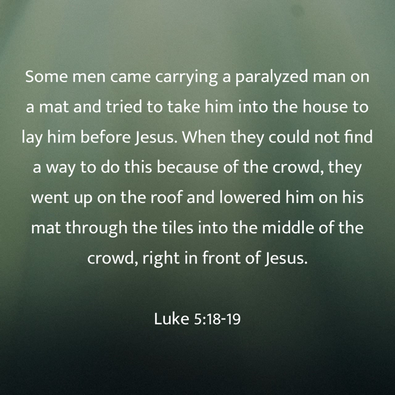|
Good morning!
We're so glad you decided to join us today!
When we meet in person, we take time to share our joys and concerns. Take some time to consider your past week. If you have prayer requests, please add them as a comment to this post. When you are ready, use the prayer below (source: Pray the Word podcast) to get started.
God, we pray that every day as we hear your word by our spirit, you would soften our hearts and minds and our lives would indeed be fertile.
This week's lesson is on Matthew 13:1-9, 18-23.
Researchers have identified 5 to 9 different teaching methods that Jesus used. One of the methods was parables. One definition of a parable is an earthly story with a heavenly meaning. Another definition is a narrative of some real or imaginary event in nature or in common life which is adaptive to suggest a moral or religious truth. Matthew 13 has been called “the parable chapter” because it has the greatest concentration of parables in the book. It has 16.
When Jesus went out of the house and sat by the lake a large crowd gathered around him that he got into the boat while the people stood at the shore. The acoustic properties of the surface of the water allowed the large crowd to hear Jesus' voice clearly. Jesus began to tell the parable of the Sower. A farmer would have saved his seed from the last crop just for planting. Seeds were a precious commodity and planting day required preparation. The soil had to be tilled to receive the seeds and the soil had to be moist and warm enough to germinate and begin to grow. The crowd had this life experience to relate to. No matter how experienced the farmer sowing seeds from hand could not be perfect. Some seeds would fall along the hard packed soil of the path to the field. Having no cover for the seeds the birds would have eaten the seeds. The second word picture is that of the soil characterized as lacking depth because it is rocky. Hard bedrock might be but an inch or two under the surface in the hilly terrain of Galilee. Shallow soil can lose almost all its water content and the plants would not have a deep root system. When there was a lack of rain and a hot sun it would cause them to be scorched and wither away. A third type of soil could be dirt having noxious weeds or thorns. The sower's wheat or barley seeds would have to compete with the weeds or thorns and his crop will be choked, producing puny growth and little grain. I understand this verse because I have a garden that if not weeded regularly will be overgrown with weeds. Some seeds were cast in good soil. The soil that is not hard packed, not shallow or not full of thorns and the wheat or barley would grow quickly and produce a great return. The stated return would have been amazing to Jesus' audience. They estimated that even the best years in Palestine might have yielded a ten-fold harvest. Jesus was saying a hundred, sixty or thirty times what was sown. Such a marvelous harvest could only be miraculously accomplished through the blessing of God. Whoever has ears, let them hear. Jesus looks for those who have “spiritual ears” able to discern the truths he was teaching. They understood the deeper message. The disciples wanted to know the meaning of this parable. So Jesus explained it to them. It is not a literal farmer but as a preacher of the message about the Kingdom. No one fits this description better than Jesus himself, for he had come reaching the good news of the kingdom of God. Jesus preaching was met with various reactions. Some hearers were (and are) like the hardened soil, with hearts and minds that do not understand even the basics of what Jesus was (and is) trying to communicate. The result: being like seeds that never even sprout. There can be no faith if there is no understanding. The attack comes not from literal birds, but from the evil one – Satan himself. It is he who encourages people to dismiss the pleadings and warning of Jesus as nonsense. A second type of soil is the hearer who is initially thrilled by the good news heard in Jesus' message about the kingdom. That message is understood and creates joy and hope in this person. Despite this joyous reception, though, there are some who do not take this message to heart in a lasting way. They do not have an enduring faith. Jesus had taught that the kingdom must be received in repentance, a change in orientation toward God and away from sin. Some are buoyed by the joy they experience, but they do not have a change in heart. When there is trouble or persecution, their shallow faith will not survive. They will be like the shallowly rooted plants that cannot endure the scorching sun. The third type of reception of Jesus' message is found among those who do not forsake their worldly desires for service in the kingdom. Jesus would later say that to be his disciple one has to “deny themselves and take up their cross and follow me.” Believers can not have divided loyalties. We can not serve two masters equally. A person who is still attached to the god of money may give the appearance of being a disciple but he or she will be an unfruitful disciple. A wheat plant that competes with weeds and thorns for water, soil, nutrients and sunlight will not flourish or produce. Three things will happen when Jesus' message falls on those with “ears to hear.” First, the people will listen sincerely and earnestly. They will truly hear the word of salvation. Second, they will understand the basis of the message and the personal consequences for disbelieving it. Third, this understanding and the faith that follows will be demonstrated in these people bearing fruit. They will be disciples who make other disciples, who do good works as service to Christ and his church. Those who seek to serve with sincere hearts will have astounding results.
Conclusion: Four Types of Hearers
A common application for the sower parable is to ask, “What kind of soil are you?” While this question may cut to the heart of being a disciple and give us pause for self-examination, the parable is more about the sower than the soils, about Jesus and other preachers who spread the divine seed of God's Word. Preachers and teachers who faithfully communicate the gospel will meet many reactions, just as the seed encountered several soils. We will not always be able to know the hearts and minds of those with whom we share the gospel. Even so, the wise and talented sower spreads the seed widely, ever knowing that some seed will not produce fruit. The wise preacher keeps preaching, and the wise teacher keeps teaching - always looking for opportunities to share the gospel. Faith is sometimes kindled and brought to a blazing fire in unlikely people. The most passionate and bitter enemy of the church may be but a few steps away from the walk of a joyous believer. God empowers our gospel proclamation. We offer the word, but God touches those having “spiritual ears” and draws them to faith. We pray for those with “ears to hear” and faithfully proclaim the gospel to “let them hear.” Prayer Lord of the harvest, may we remain faithful to the task of proclaiming the gospel. May we not prejudge potential hearers. Instead, we trust that your Spirit will work to bring others to faith. We pray in Jesus' name. Amen
Questions for discussion
Benediction
This week's benediction comes from the New English Translation.
Next week's lesson will be on Matthew 13:24-30, 36-43.
0 Comments
Leave a Reply. |
AuthorWe are a small, rural Presbyterian church in southwestern Pennsylvania. Archives
July 2024
Categories
All
|



 RSS Feed
RSS Feed